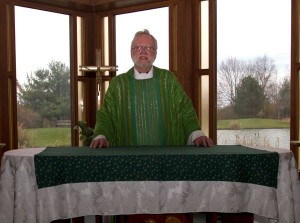For the first time in more than 40 years, the Catholic liturgy will change, moving closer to the original Latin scripture, and members of the Ithaca College community are already embracing it.

With the beginning of Advent on Nov. 27, some common phrases in Mass will be altered to reflect a closer translation to traditional Latin text.
The change will apply to all English-speaking countries. Priests will now use a new English translation of the Roman Missal in Mass, which will include updated translations of existing prayers, common responses and songs.
Father Carsten Martensen, the Catholic chaplain at the college, said he expects the transition to the new liturgy to be smooth. At the chapel on campus, the congregation has already begun practicing some of the changes.
One common phrase that will change is when a priest says to the congregation, “May the Lord be with you,” and they respond, “And also with you.” Instead, members will now reply, “And with your spirit.”
Martensen said he remembers the last change in liturgy from Latin to colloquial English in the United States. That was in 1969.
“Language changes, language grows,” he said. “It’s organic, and so it was thought that after 30 to 40 years, it’s about time to renew and see what better ways — or proper ways — of expressing some of the ancient prayers that we’ve been saying for 2,000 years.”
The translation was done by the International Commission on English in the Liturgy, a mix of Catholic bishops and scholars from all over the world who spent more than 10 years preparing the translation and music in The Roman Missal, Third Edition.
Martensen said the changes will mostly affect priests who have to relearn many prayers.
“A lot of the prayers that the priest says are more detailed,” he said. “They’re expanded, they’re long. I have to practice to make sure I’m emphasizing the right parts.”
Beverly LaBelle, pastoral associate at the Church of the Blessed Sacrament in Rochester, said it will be fairly easy for churchgoers to make the switch to the new responses if they attend regularly.
“People will have to look at it maybe with new eyes and see things that they haven’t seen before — that they’ve become so used to — that sometimes you just don’t even hear what you are saying,” she said. “This might force people to wake up a bit and listen to the responses they are making.”
LaBelle said her church has encountered some opposition, but she mostly has seen a positive response.
“People ask why this is necessary,” she said. “It is a long discussion, but in general I think that people want to focus on other aspects of the church, and are happy that nothing else is changing except some of the wording in the Mass.”
Stephen Hill, campus minister, said by going back to the liturgy’s roots, it recaptures some of the meaning of words.
“It’s really important to comb the depths of our past, our history, our traditions,” he said. “It’s important to be on the same ground and look at worships through a different lens.”
Martensen said he sees the change in liturgy as a way for people to be more aware of scripture.
“We’re moving forward by getting in touch with our roots,” he said. “It’s not moving back because we’re using language as it develops and grows.”







